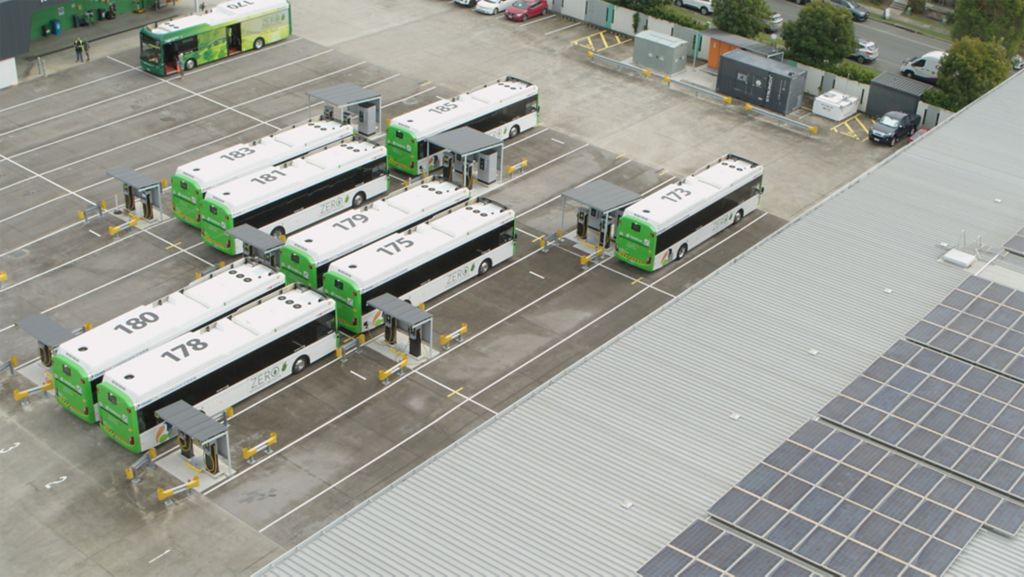How Keolis Downer is leading Brisbane’s charge towards sustainable public transport


In the picturesque seaside suburb of Redcliffe, north of Brisbane, residents and tourists alike enjoy the sun, sand and surf, and alfresco dining with ocean views. The only blemish is the traffic passing through – but at least now many of the buses are fully electric, gliding past with minimum noise and no exhaust fumes.
“The electric buses are fantastic,” says Kris Kokot, Support Service Manager, Keolis Downer, the PTO for the electric buses. “They’re smooth, they’re quiet, they’re green. All in all, our drivers really enjoy driving them, our passengers enjoy being on them, and the community enjoys having them around.”
The electric buses are fantastic…our drivers really enjoy driving them, our passengers enjoy being on them, and the community enjoys having them around.
A short distance from Redcliffe is Keolis Downer’s North Lakes depot – the first all-electric bus depot in Queensland. Until recently, the depot catered only for conventional diesel vehicles but now all the petrol pumps have been replaced with high-speed plug-in chargers. From here, Keolis Downer’s fleet of 16 electric Volvo BZL with Volgren bodies service Brisbane’s northern suburbs, including Redcliffe.
The vehicles fully charge overnight, and call-in for top-up charging on-route during the day.
The depot is dimensioned to cater to more vehicles in the future. Keolis Downer has chosen a stepwise approach to ensure the most sustainable outcome and scale up as they learn.
“Making the transition from diesel to fully-electric has been a long and challenging journey,” says Kris. “Being the first depot to go fully electric comes with a lot of work. A lot of training, lots of planning, lots of new decisions – but the result is very rewarding.”
Keolis Downer has taken many important steps on its electromobility journey. The company operates more than 1,300 buses across Australia and will be transitioning several depots and more than 300 buses to electric in the coming years.
A transition of this magnitude cannot be undertaken by one operator alone – it requires multiple investments in parallel and strong collaboration between governments, public transport authorities, energy providers and the general public.
In Keolis Downer’s case, the conversion to a full-electric depot was done in partnership with the Queensland Government, who financed the project as part of its Zero Emission Bus (ZEB) program. From 2025, all new public transport buses in southeast Queensland will be zero emission vehicles. As one of the state’s main PTOs, Keolis Downer has been heavily involved in the project from an early stage and began discussions with the government already in 2018.
Keolis Downer has also had to work closely with local energy providers to increase the depot electrical capacity to meet its significantly increased needs. When it came to charging infrastructure and equipment, Keolis Downer was able to leverage the broad expertise and competence within the Downer Group.
Next, its drivers needed to be trained in how to operate the new vehicles, while its mechanics needed additional training for service and maintenance.
“The vehicles are totally different from what we had before, so there has been quite a lot training involved in making the transition,” says Kris. “For the mechanics, Volvo Buses has a five-day training course which teaches them how to stay safe whilst operating in and around the battery. For example, how to de-energize the buses before servicing, the different mechanical features of the vehicles and how to reenergize the batteries to allow the buses to get back out on the road.”
By 2032, the Queensland Government aims to have at least 70 percent of the state’s energy come from renewable sources. When this is achieved, it will have a big effect on the overall environmental impact of the electric buses. In the meantime, Keolis Downer purchases Renewable Energy Certificates, as part of a government program designed to subsidize and incentivize renewable energy generation. For its part, Keolis Downer purchases enough certificates to cover at least 100 percent of its own energy consumption, which is way above the mandated minimum of 18 percent.
“The Queensland Government is fully committed to transitioning to green energy,” says Kris. “Solar power is a huge part of that transition, along with wind farms and hydrogen. As these things come into place and continue to grow, more and more renewable energy will become available in the grid, which will then feed into places like our depot here.”
If all goes to plan, by the time of the Olympic torch is light at the opening ceremony, Brisbane will have a clean, quiet and efficient public bus network for the whole city to enjoy – for the Olympics and beyond.
Keolis Downer in short
Keolis Downer is a leading operator and integrator of public transport in Australia. The company operates more than 1,300 buses in New South Wales, Western Australia, South Australia and Queensland. With over 5,300 employees and a presence in five states, Keolis Downer enables 350 million passenger journeys per year.